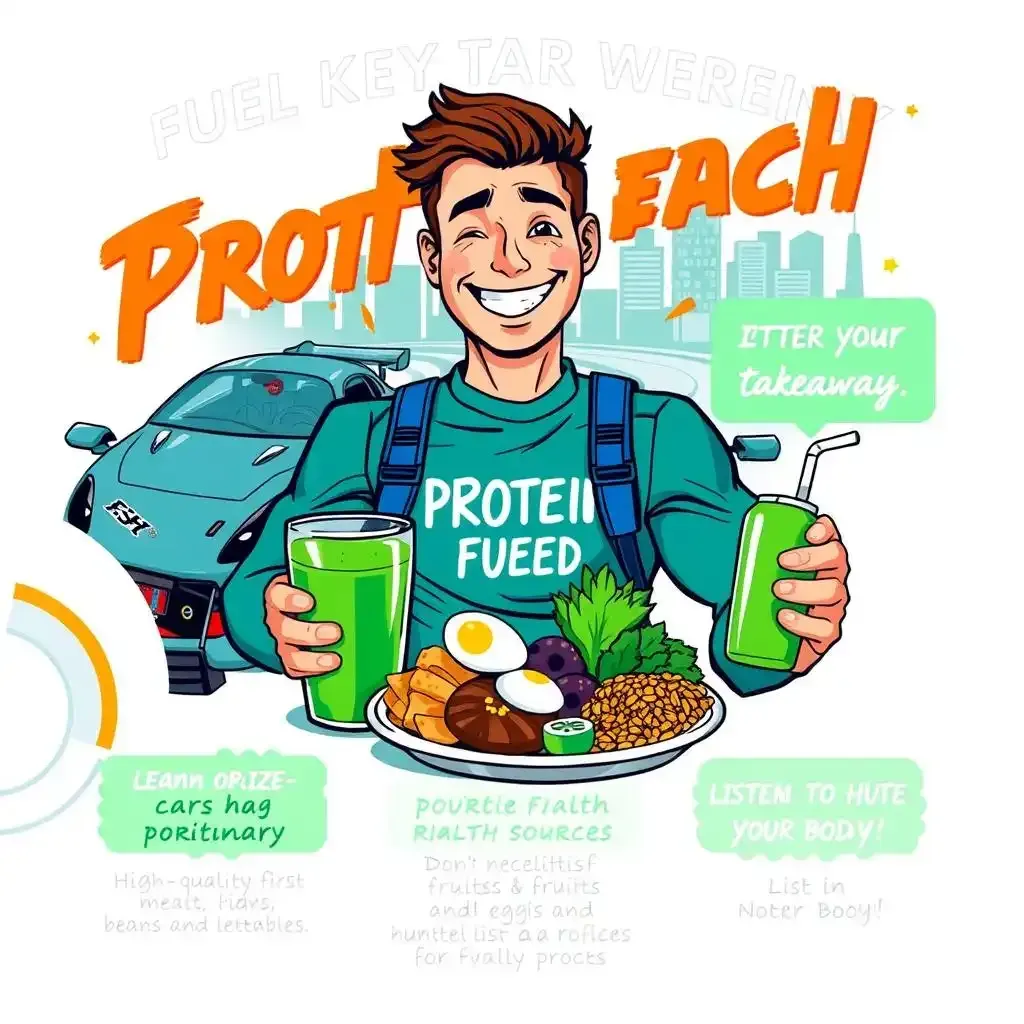Table of Contents
Ever heard of a Protein Cleanse? It sounds a bit like a superhero's secret weapon, right? But before you imagine yourself bursting with energy and shedding pounds like magic, let's talk turkey. A protein cleanse isn't some mystical potion; it's a dietary approach that emphasizes protein intake while restricting certain foods. Some people believe it can help with weight loss, detoxification, and even improved athletic performance. But, like any diet, it's got its pros and cons. This article will explore the science behind protein cleanses, separate fact from fiction, and guide you towards making informed decisions about your health. We'll uncover the potential benefits, address common misconceptions, and provide practical tips for safely and effectively incorporating a protein cleanse into your lifestyle. Remember, always consult a doctor or registered dietitian before making significant changes to your diet, especially if you have any underlying health conditions. For more information and delicious, healthy recipes, visit detoxjuice.homes.

Amazing Protein Cleanse: Achieve Your Goals
Protein Cleanse: Revealing the Myths and Realities

Protein Cleanse Revealing The Myths And Realities
Okay, so you're curious about protein cleanses? That's awesome! Let's ditch the hype and get down to brass tacks. I've been researching this stuff, and honestly, it's a bit of a wild west out there. You'll find tons of claims – "lose ten pounds in a week!", "flush out toxins!", "boost your metabolism!" But let's be real, a lot of it is marketing fluff. A protein cleanse usually involves eating a ton of protein and cutting out carbs and fats. Sounds simple, right? But it's not a magic bullet. Think of it like this: your body needs all sorts of nutrients, like a car needs different kinds of fuel to run smoothly. If you only give it one type of fuel (protein), it might sputter and eventually stall. Many people think it's this amazing detox – that's a bit of an overstatement. Your liver and kidneys already do a fantastic job of detoxing your body, so you don't need a special cleanse to help them.
What *can* be helpful, though, is focusing on high-quality protein sources. Think lean meats, fish, beans, lentils – the good stuff! These provide the building blocks your body needs for muscle repair and other important functions. But remember, a balanced diet is still king. Cutting out entire food groups can lead to nutrient deficiencies and leave you feeling drained, not energized. For more on balanced eating, check out our guide to juice diet plans! It's crucial to listen to your body. If you're feeling weak or unwell, stop the cleanse and see a doctor. Don't just blindly follow some online fad.
Myth | Reality |
|---|---|
Protein cleanses magically detoxify your body. | Your body already has a fantastic detoxification system. |
You'll lose tons of weight quickly. | Weight loss depends on many factors; rapid weight loss can be unhealthy. |
It's a sustainable long-term solution. | It's usually a short-term dietary approach, not a lifestyle change. |
Another important thing to consider is the potential for nutrient imbalances. If you're only eating protein, you're missing out on essential vitamins and minerals found in fruits, vegetables, and whole grains. This could lead to fatigue, weakness, and other unpleasant side effects. Think of it like trying to build a house with only bricks – you need wood, cement, and other materials for a strong structure! And let's not forget the potential for digestive issues. A sudden shift in your diet can upset your gut bacteria, leading to bloating, constipation, or diarrhea. You can find out more about the risks involved in juice cleanse risks.
Before you even think about starting a protein cleanse, it's super important to talk to your doctor or a registered dietitian. They can assess your individual needs and help you create a safe and effective plan. They can also help you avoid any potential pitfalls. They'll help you determine if this is even the right approach for you, considering your overall health and goals. Remember, a healthy diet is a balanced diet, and quick fixes rarely lead to lasting results. If you're looking for ways to improve your diet and overall health, check out our detox juice benefits page for more information.
- Consult a doctor or dietitian before starting any cleanse.
- Focus on whole, unprocessed foods.
- Listen to your body and adjust as needed.
Understanding the Science Behind Protein Cleanses
Hey there, fellow author! So you're diving into the world of protein cleanses? Buckle up, it's a wild ride! I've been researching this, and let me tell you, it's a bit of a mixed bag. A lot of the hype is just that – hype. People claim incredible weight loss, amazing detox effects, and supercharged energy. But the truth? It's more nuanced than that. Think of your body like a complex machine – it needs a variety of nutrients, not just one type of fuel. A protein-only diet is like trying to run a car on just gasoline – it might work for a bit, but eventually, it'll break down. For a balanced approach, check out our !
The science is pretty straightforward: protein is essential for building and repairing tissues, making enzymes, and lots of other bodily functions. But you need carbs and healthy fats too! These provide energy and essential fatty acids, which are crucial for brain function and hormone production. Cutting out entire food groups can lead to nutrient deficiencies, leaving you feeling sluggish and irritable, not energized and refreshed. It's all about balance, my friend. Remember, you can find more information about responsible cleansing on our natural detoxification system page.
Nutrient | Role in the Body | Potential Deficiency Symptoms (from protein-only diet) |
|---|---|---|
Carbohydrates | Energy source for brain and muscles | Fatigue, weakness, dizziness |
Healthy Fats | Hormone production, brain function | Dry skin, hair loss, hormonal imbalances |
Vitamins & Minerals | Various bodily functions | Weakened immune system, digestive problems |
Now, let's talk about the "detox" aspect. Your liver and kidneys are already amazing detox machines. They work tirelessly to filter out waste products. A protein cleanse won't magically make them work better. In fact, overloading your system with protein might even put extra strain on these organs. It's like expecting your garbage disposal to handle an entire mountain of trash – it'll eventually clog up! So, while focusing on protein *can* be part of a healthy diet, it shouldn't be the only thing you eat, especially not for extended periods. Want some yummy and healthy recipe ideas? Check out our breakfast zinger juice recipe.
One thing I see a lot is people thinking that a protein cleanse is a quick fix for weight loss. While you might see some initial weight loss due to water loss (not actual fat loss!), it's often short-lived and unsustainable. Plus, restricting your calories too drastically can actually slow down your metabolism, making it harder to lose weight in the long run. It's like trying to lose weight by only drinking water – you'll feel terrible, and it won't work permanently. If you are looking to lose weight, you can also explore detox juice benefits for weight loss.
- Protein is crucial, but it's not the only nutrient your body needs.
- Your body's natural detoxification system is already super efficient.
- Sustainable weight loss comes from balanced nutrition and lifestyle changes.
Remember, I'm not saying protein cleanses are *always* bad. For some people, a short-term, well-planned protein-focused approach might be helpful under the guidance of a healthcare professional. But it's crucial to understand the science behind it to avoid potential harm. Always consult a doctor or registered dietitian before making any major dietary changes, especially if you have any underlying health conditions. We have more information about risks on our page.
Finally, let's not forget the importance of listening to your body! If you feel unwell during a protein cleanse, stop immediately. Pain, fatigue, or digestive issues are signs that something's not right. Don't push through it – your health is always more important than a quick weight loss strategy. A healthy diet is a balanced diet, and there's no magic bullet. Explore different ways to improve your health with our page.
Optimizing Your Protein Cleanse for Maximum Benefits

Optimizing Your Protein Cleanse For Maximum Benefits
Okay, so you've decided to try a protein cleanse. Smart! But let's make sure we do this right, not like some crazy fad diet. Think of your body as a super-powered race car—it needs the right fuel to perform at its best. A protein cleanse is like giving it high-octane fuel, but you still need the right tires (other nutrients!) and a well-maintained engine (overall health!).
First things first: quality over quantity. Forget those protein bars packed with sugar and artificial stuff. We're talking lean meats, fish bursting with omega-3s, eggs, beans, and lentils. These are your superstars! They provide the protein your body needs to repair muscles and keep everything running smoothly. Don't forget to drink plenty of water—it's like the oil in our race car engine; it keeps everything lubricated and running smoothly. Learn more about responsible cleansing on our page.
Good Protein Sources | Why They're Awesome |
|---|---|
Chicken Breast | Lean, versatile, packed with protein |
Salmon | Omega-3 fatty acids for brain strength! |
Lentils | Fiber and plant-based protein |
Next up: Don't forget your veggies! I know, I know, they're not protein, but they're vital. They're like the vitamins and minerals that keep your race car tuned up. Think colorful veggies—broccoli, spinach, bell peppers—they're packed with nutrients that a protein-only diet will miss. Aim for at least five servings a day. Want some delicious ways to sneak in more veggies? Check out our green detox recipes!
Listen to your body. It's your best guide. If you're feeling tired or weak, that's your body screaming for help! Don't push through it. Ease up on the protein, add some healthy fats like avocados or nuts, and increase your veggie intake. A balanced diet is key! Remember to stay hydrated. You can explore more on the benefits of detox juices on our page.
- Prioritize high-quality protein sources.
- Don't neglect your fruits and vegetables.
- Listen to your body and adjust your plan as needed.
Finally, remember that this is a short-term strategy, not a lifestyle. Protein cleanses aren't meant to be forever. They can help you reset your eating habits, but long-term health comes from a balanced, varied diet. Once the cleanse is over, gradually reintroduce other foods. Don't just jump back into sugary drinks and processed foods! For more tips on healthy eating habits, check out our .
Don't forget to consult a doctor or registered dietitian before starting *any* cleanse, especially if you have any underlying health conditions. They can help you create a plan that's safe and effective for you, making sure you're getting all the nutrients you need. A healthy body is a balanced body, remember that! For more information on healthy juice recipes, check out our .
"The best way to find yourself is to lose yourself in the service of others." - Mahatma Gandhi
Final Thought
Ultimately, a protein cleanse, like any dietary approach, isn't a one-size-fits-all solution. Its effectiveness depends on individual factors, adherence to the plan, and overall health. While it might offer some short-term benefits for weight management or improved energy levels for certain individuals, it's crucial to approach it with a balanced perspective. Remember to prioritize whole foods, stay hydrated, and listen to your body. If you're considering a protein cleanse, consult a healthcare professional to determine if it aligns with your health goals and needs. Remember, sustainable lifestyle changes are key to long-term well-being, not quick fixes.